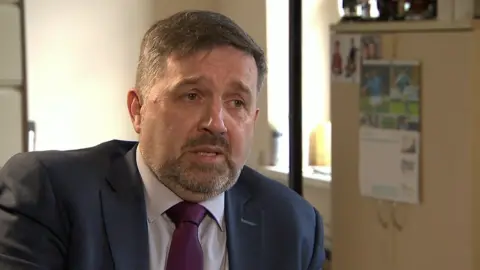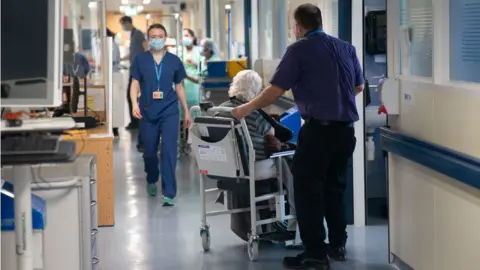With Robin Swann stepping down, what next for NI health service?
 Empics
EmpicsSo now we know Robin Swann's intentions, the question is, what is next for Northern Ireland's health and social care service?
With one eye on Westminster and collecting votes, will Mr Swann feel he can make some controversial decisions before he exits to knock on doors? Unlikely.
So, in effect, it feels we are again in limbo, waiting for a budget, a programme for government and news of a new health leader while services and waiting lists continue to deteriorate.
Everyone, including Mr Swann, was shocked when he returned as health minister in February 2024.
The feeling was that health required the direction of one of the two bigger parties, but Sinn Féin and the DUP shied away and instead the Ulster Unionists stepped up.
Prior to that move, Mr Swann would only laugh at the suggestion of a second time at the helm.
While he knew it made sense, he was also setting his sights on Westminster.
The question is, should he have stepped in knowing he would be stepping away within months and once an election was called?
Health is a beast of a brief that requires stability, understanding, direction and, most importantly, brave leadership.
It also requires someone to make controversial decisions - which no politician wants to make, particularly when canvassing at doors.
Doug Beattie argued that moving Mr Swann into the position made sense, as he would be more than familiar with the department's in-tray and be able to hit the ground running.
The question is, has he?
A £70m support package for social care providers and hospices was among his first announcements - an early indication that social care, normally the poor relation, would be among his priorities.
Other financial announcements have been made around dental access, general practice and, most significantly, health workers' pay.
There have also been small adjustments made to fertility treatment, a women's health action plan and vasectomy services switching to primary care.
Not bad for just a few months in office but the truth is that bolder decisions are required if the health service is to stay afloat.
Mr Swann has said this has not been possible without a programme for government or a budget; in fact he has said on repeat that there is a "huge mismatch between expectations and financial realities".
He has also asked for an additional £1bn to just stand still - half of that amount will go towards pay.
 Jeff Moore
Jeff MooreThe harsh reality is that all five health trusts are in deficit.
That means that once a budget is approved, they will most likely be asked to break even, which means they will have to prioritise - even cut services.
Things are fragile.
Last week Northern Ireland was awash with dire warnings from our main Royal Colleges.
In the coming weeks, the Department of Health is to publish its blueprint for the reconfiguration of hospitals.
That means hospitals will be given the status of either being a regional or area hospital.
The UK Covid Inquiry is about to arrive in town to start hearing local evidence from health and political chiefs.
All in all, there are lots of plates spinning.
While Mr Swann remains in charge, he is probably breathing a sigh of relief - he now has an exit plan.
